CCRN
CCRN
Page 3 out of 961 results
Sort by
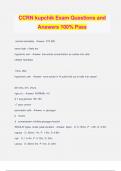
-
CCRN kupchik Exam Questions and Answers 100% Pass
- Exam (elaborations) • 24 pages • 2024
- Available in package deal
-
- $12.49
- + learn more
CCRN kupchik Exam Questions and Answers 100% Pass normal osmolality - Answer- 275-295 osmo high = likely dry hypotonic soln - Answer- low solute concentration so rushes into cells cellular hydration 1/2ns, d5w hypertonic soln - Answer- more solute in IV pulls fluid out of cells into vessel d51/2ns, d10, 3%ns hgb a1c - Answer- NORMAL 4-5 6-7 avg glucose 100-150 >7 poor control pancreatic cells - Answer- a- glucagon b - insulin d - somatostatin (inhibits glucagon/insulin) INSULIN...
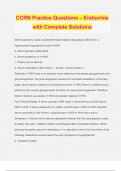
-
CCRN Practice Questions – Endocrine with Complete Solutions
- Exam (elaborations) • 29 pages • 2024
- Available in package deal
-
- $13.49
- + learn more
CCRN Practice Questions – Endocrine with Complete Solutions Which laboratory values would differentiate diabetic ketoacidosis (DKA) from a hyperosmolar hyperglycemic state (HHS)? a. Serum glucose of 600 mg/dL b. Serum potassium of 4 mEq/L c. Positive serum ketones d. Serum osmolality of 320 mOsm/L - Answer- Correct answer: c Rationale: In DKA there is an absolute insulin deficiency that causes glycogenolysis and gluconeogenesis. The gluconeogenesis causes the incomplete breakdown of f...
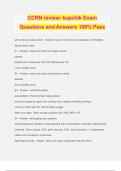
-
CCRN review- kupchik Exam Questions and Answers 100% Pass
- Exam (elaborations) • 15 pages • 2024
- Available in package deal
-
- $12.49
- + learn more
CCRN review- kupchik Exam Questions and Answers 100% Pass where do coronaries arise - Answer- base of aorta (sinus of valsalva); immediately above aortic valve S1 - Answer- closure of mitral & tricuspic valves systole loudest over mitral area, 5th ICS midclavicular line 1/3 of cardiac cycle S2 - Answer- closure of aortic and pulmonic valves diastole 2/3 of cardiac cycle S3 - Answer- ventricular gallop auscultated in fluid overload; high preload. sound is caused by rapid rush of bloo...
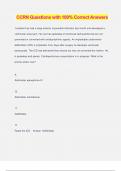
-
CCRN Questions with 100% Correct Answers
- Exam (elaborations) • 59 pages • 2024
- Available in package deal
-
- $13.49
- + learn more
CCRN Questions with 100% Correct Answers A patient has had a large anterior myocardial infarction last month and developed a ventricular aneurysm. He now has episodes of ventricular tachycardia that are not prevented or converted with antidysrhythmic agents. An implantable cardioverter- defibrillator (ICD) is implanted. Four days after surgery he develops ventricular tachycardia. The ICD has delivered three shocks but has not converted the rhythm. He is pulseless and apneic. Cardiopulmonar...
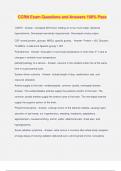
-
CCRN Exam Questions and Answers 100% Pass
- Exam (elaborations) • 39 pages • 2024
- Available in package deal
-
- $13.49
- + learn more
CCRN Exam Questions and Answers 100% Pass SIADH - Answer- increased ADH level, holding on to too much water, dilutional hyponatremia. Decreased osmolarity=hypoosmolar. Decreased urinary output. CSF normal protein, glucose, WBCs, specific gravity, - Answer- Protein <100, Glucose: 70 WBCs: 4 cells/mm2 Specific gravity 1.007 Poikothermia - Answer- fluctuation of core body temperature of more than 2° C due to changes in ambient room temperature pathophysiology of a seizure - Answer- neuro...
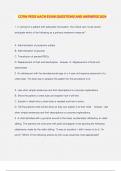
-
CCRN PEDS AACN EXAM QUESTIONS AND ANSWERS 2024
- Exam (elaborations) • 54 pages • 2024
- Available in package deal
-
- $13.49
- + learn more
CCRN PEDS AACN EXAM QUESTIONS AND ANSWERS 2024 1. In caring for a patient with salicylate intoxication, the critical care nurse would anticipate which of the following as a primary treatment measure? A. Administration of protamine sulfate B. Administration of glucose C. Transfusion of packed RBCs D. Replacement of fluid and electrolytes - Answer- D. Replacement of fluid and electrolytes 2. An adolescent with the developmental age of a 4-year-old requires placement of a chest tube. The b...
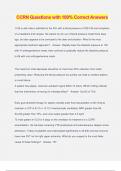
-
CCRN Questions with 100% Correct Answers
- Exam (elaborations) • 22 pages • 2024
- Available in package deal
-
- $13.49
- + learn more
CCRN Questions with 100% Correct Answers A 56 yr-old male is admitted to the ICU with a blood pressure of 225/135 and complains of a headache and nausea. He reports he ran out of blood pressure meds three days ago, but also appears to be confused to the date and situation. What is the most appropriate treatment approach? - Answer- Rapidly lower the diastolic pressure to 100 with IV antihypertensive meds, then continue to gradually reduce the diastolic pressure to 85 with oral antihypertens...
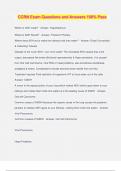
-
CCRN Exam Questions and Answers 100% Pass
- Exam (elaborations) • 53 pages • 2024
- Available in package deal
-
- $13.49
- + learn more
CCRN Exam Questions and Answers 100% Pass Where is ADH made? - Answer- Hypothalamus Where is ADH Stored? - Answer- Posterior Pituitary Where does ADH act to make the kidneys hold onto water? - Answer- Distal Convoluted & Collecting Tubules Disease of too much ADH = too much water! The increased ADH causes less urine output, decreased Na levels (dilutional hyponatremia) & Hypo-osmolarity. It is caused from Oat Cell Carcinioma, Viral PNA or head problems, also sometimes anesthesia, analges...
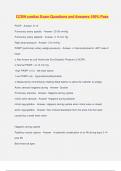
-
CCRN cardiac Exam Questions and Answers 100% Pass
- Exam (elaborations) • 18 pages • 2024
- Available in package deal
-
- $12.49
- + learn more
CCRN cardiac Exam Questions and Answers 100% Pass PAOP - Answer- 8-12 Pulmonary artery systolic - Answer- 20-30 mmHg Pulmonary artery diastolic - Answer- 5-15 mm Hg Right atrial pressure - Answer- 2-6 mmHg PAWP (pulmonary artery wedge pressure) - Answer- o Volume/preload in LEFT side of heart. o Also known as Left Ventricular End Diastolic Pressure (LVEDP) o Normal PAWP = 6-12 mm Hg High PAWP (>12) - left heart failure Low PAWP (<6) - hypovolemia/dehydration o Measured by moment...
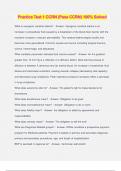
-
Practice Test 1 CCRN (Pass CCRN) 100% Solved
- Exam (elaborations) • 19 pages • 2024
- Available in package deal
-
- $12.49
- + learn more
Practice Test 1 CCRN (Pass CCRN) 100% Solved What is vasogenic cerebral edema? - Answer- Vasogenic cerebral edema is an increase in extracellular fluid caused by a breakdown of the blood-brain barrier with the resultant increase in vascular permeability. This cerebral edema begins locally and becomes more generalized. Common causes are trauma (including surgical trauma), tumors, hemorrhage, and abscesses What ventilator parameter indicates fluid volume excess? - Answer- An A:a gradient gr...

That summary you just bought made someone very happy. Also get paid weekly? Sell your study resources on Stuvia! Discover all about earning on Stuvia


